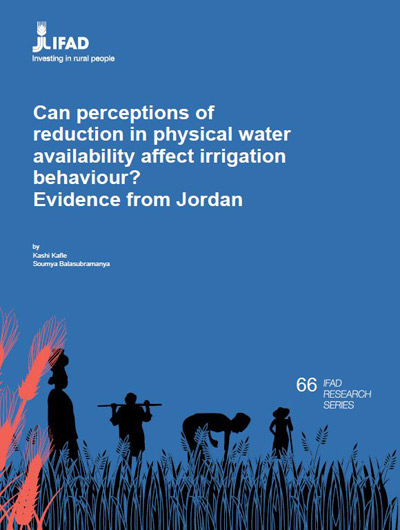Serie de investigaciones No 66: Las percepciones de la reducción de la disponibilidad física de agua, ¿pueden afectar al comportamiento de riego? Datos de Jordania
Serie de investigaciones No 66: Las percepciones de la reducción de la disponibilidad física de agua, ¿pueden afectar al comportamiento de riego? Datos de Jordania
Las frecuentes sequías y el rápido agotamiento de las reservas de agua subterránea han agravado la crisis de escasez de agua en Jordania. Aunque la mayoría de las explotaciones agrícolas utilizan tecnologías de "ahorro de agua", el agotamiento de las aguas subterráneas continúa a un ritmo alarmante. En este estudio se investiga cómo las percepciones de la disponibilidad física del agua en el pasado están relacionadas con el comportamiento actual de los agricultores en materia de riego: frecuencia de riego y métodos utilizados para determinar la necesidad de riego.
El estudio se encuentra disponible en inglés.
Using primary data from a survey of 414 commercial farms in Mafraq and Azraq governorates, we find that respondents who perceived reduction in physical water availability and faced agricultural losses in the past irrigated more frequently and were more likely to use self-judgement in determining irrigation need. These relationships were more pronounced for smaller farms, farms with sandy soil, mono-cropping farms and farms where the owner was the manager.
These effects were lower for farms that preferred internet-based and in-person approaches for receiving irrigation advice. In addition, while the frequency of irrigation was higher among stone-fruit farms, the probability of using self-judgement in determining irrigation need was higher in olive farms and vegetable farms. We argue that farmers’ irrigation behaviour must be considered for groundwater management policy and planning in Jordan.
